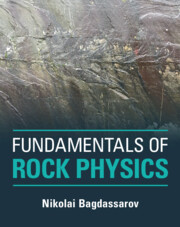Book contents
- Fundamentals of Rock Physics
- Fundamentals of Rock Physics
- Copyright page
- Dedication
- Contents
- Preface
- 1 Introduction
- 2 Density and Porosity
- 3 Stresses in Rocks
- 4 Mechanical Strain and Elastic Moduli
- 5 Permeability of Rocks
- 6 Mechanical Properties of Fluid-Bearing Rocks
- 7 Acoustic Properties of Rocks
- 8 Electric Resistivity
- 9 Dielectric Properties
- 10 Magnetic Properties of Rocks
- 11 Thermal Properties of Rocks and Minerals
- 12 Radioactive Properties of Rocks
- Index
- References
1 - Introduction
Published online by Cambridge University Press: 19 November 2021
- Fundamentals of Rock Physics
- Fundamentals of Rock Physics
- Copyright page
- Dedication
- Contents
- Preface
- 1 Introduction
- 2 Density and Porosity
- 3 Stresses in Rocks
- 4 Mechanical Strain and Elastic Moduli
- 5 Permeability of Rocks
- 6 Mechanical Properties of Fluid-Bearing Rocks
- 7 Acoustic Properties of Rocks
- 8 Electric Resistivity
- 9 Dielectric Properties
- 10 Magnetic Properties of Rocks
- 11 Thermal Properties of Rocks and Minerals
- 12 Radioactive Properties of Rocks
- Index
- References
Summary
There are two main sources of silicate rocks in the solar system: chondrules and calcium-aluminum rich inclusions. After the stage of collisional sticking and coagulation of dust grains into rather large planetesimal bodies, the runaway and subsequent oligarchic growth resulted in the formation of four terrestrial planets. Sinking of metallic iron alloys and rising of light silicate rocks led to the shell structure of the Earth. The global circulation of material within the Earth’s mantle in the form of convection and plate tectonics is the principal driving mechanism of the global rock cycle. Geophysical methods are used to study the fine structure of the Earth’s shells, exploiting knowledge of the physical properties of rocks. Rocks are composed of mineral grains, so their classification is based on texture, structure, formation mechanisms, and fine and micro-structures of pore space and grain boundaries. Grain size or granular analysis may be performed, aiming to differentiate sedimentary rocks. This analysis uses median and sorting, and other statistical moments of grain size distributions. Focus Box 1.1: Basics of statistics: cumulative and probability density distribution functions, normal distribution.
Keywords
Information
- Type
- Chapter
- Information
- Fundamentals of Rock Physics , pp. 1 - 27Publisher: Cambridge University PressPrint publication year: 2021
